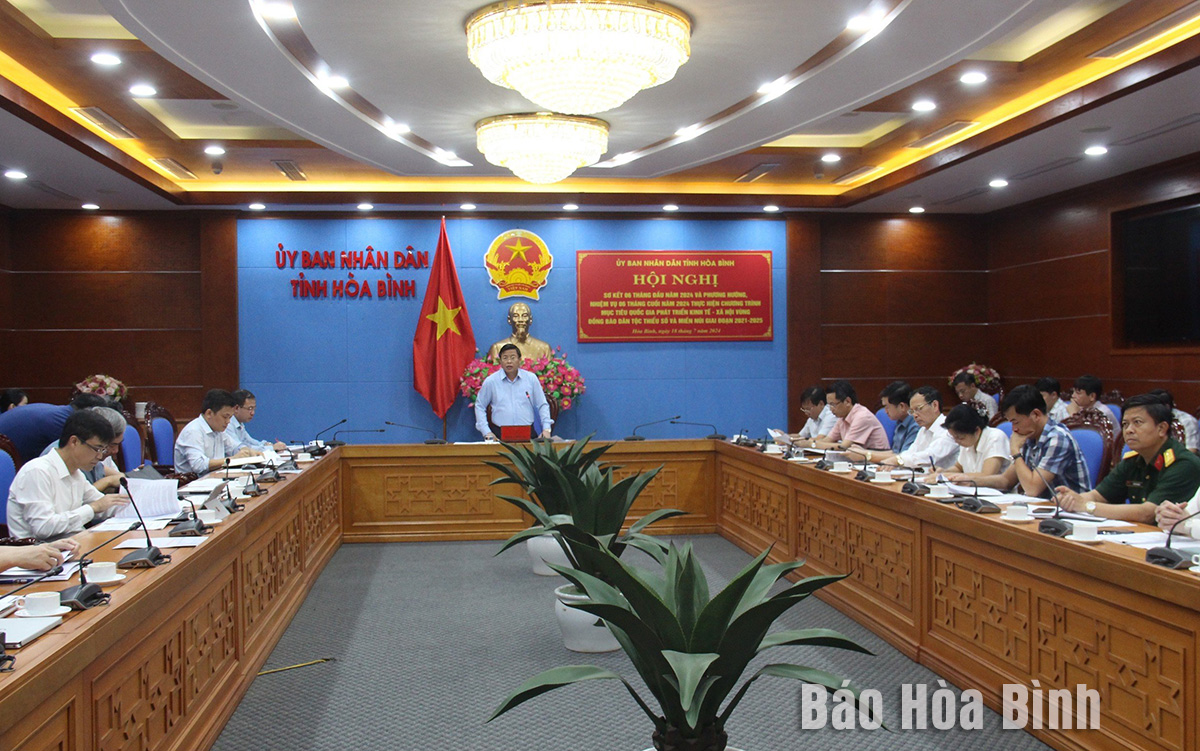
The Hoa Binh provincial People’s Committee held a meeting on July 18 to review the implementation of the national target programme on socio-economic development in ethnic minority and mountainous areas in the first half of 2024, and launch tasks and measures for H2. Vice Chairman of the provincial People’s Committee Dinh Cong Su presided over the event.
Vice Chairman of the provincial People’s Committee
Dinh Cong Su presides over the meeting.
Total funding for the programme implementation
in 2024, including the capital transferred from 2022 and 2023, stands at more
than 1.1 trillion VND (43.4 million USD). So far, over 27.6 billion VND or
8.64% of the sum transferred from 2022 and 2023, and 58.7 billion VND or 7.35%
of the capital assigned for 2024 has been disbursed.
At the meeting, officials from district-level
localities, departments, and sectors pointed out that the implementation of
some contents and the disbursement of the 2024 capital for the national target
programme are still sluggish, leading to the low disbursement rate.
They blamed the problem on the fact that the
documents guiding the programme implementation haven’t been reviewed, amended,
or supplemented in a timely manner. Preparations for the works and projects
using the state budget’s development investment capital are still made at a
snail’s pace. Some units haven’t shown reality-matching governance, policy response
remains slow, while there haven’t been breakthrough solutions.
Concluding the event, Vice Chairman Dinh Cong Su
demanded departments, sectors, and localities focus more on handling procedures
to speed up disbursement, review the works and projects lagging behind schedule
so as to build detailed disbursement plans, and specify disbursement targets to
ensure 100% of the assigned capital is allocated.
In addition, they need to enhance leaders’ sense
of responsibility towards the programme implementation; step up examination,
supervision, and assessment of the implementation of projects; and boost
monitoring to accelerate capital disbursement, he requested.
Hoa Binh province is undergoing a dynamic transformation amid Vietnam’s national digital transition. Building on Poliburo’s Resolution No. 57-NQ/TW on breakthroughs in science, technology, innovation, and national digital transformation, the province has rolled out a wide range of practical action plans. A standout initiative is the "Digital Literacy for All” movement, an effort to ensure that no one is left behind in the digital era.
Hoa Binh province is undergoing a dynamic transformation in the wake of the national digital transformation movement. Building on Resolution No. 57-NQ/TW of the Politburo on breakthroughs in science, technology, innovation, and national digital transformation, the province has implemented a wide range of practical action plans. A standout initiative is the "Digital Literacy for All” movement ambitious effort to ensure that no one is left behind in the digital age.
With a spirit of unity and proactive problem-solving, the Party Committee, the government and the people of Dong Lai Commune (Tan Lac District) have made great strides in implementing the resolutions of the 24th Party Congress of the commune for the 2020 - 2025 term. Focusing on leadership and practical actions, the commune has brought the Party’s resolutions into daily life, creating strong impacts and pushing the local development forward.
Amid the nationwide push for digital transformation, young people in Hoa Binh Province are stepping up as dynamic pioneers, applying technology to enhance Youth Union operations and expand the reach of youth-led initiatives. Through creativity and adaptability, Youth Union organizations at all levels have introduced a series of practical solutions, contributing to modern governance and community development.
In recent years, An Nghia commune, located in Lac Son district, has stepped up administrative reform, focusing on improving the quality and efficiency of its single-window service unit for receiving and processing administrative procedures. These improvements have helped create favourable conditions for local residents and organisations to handle administrative procedures, contributing to the commune’s broader socio-economic development.
The Prime Minister-approved master plan to develop the multi-use value of forests ecosystems through 2030, with a vision to 2050, aims to improve the management and sustainable use of forest resources, create jobs, increase incomes, and improve the living standards of ethnic minorities, people in mountainous and remote areas, forest workers and those living near forests.



